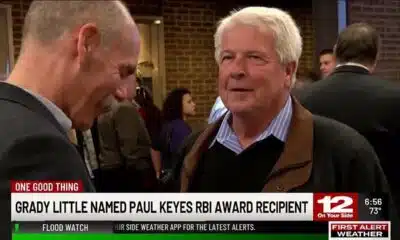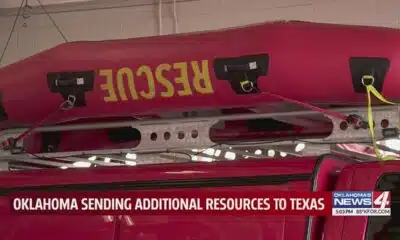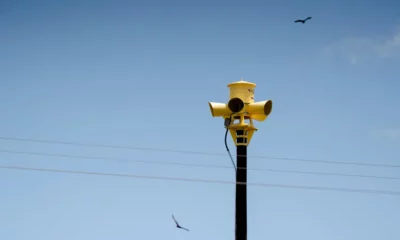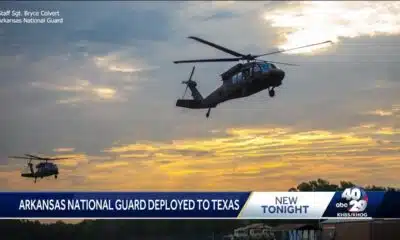News from the South - Texas News Feed
Trans Texans are Under Attack (Again), But Advocates Aren’t Giving In
When Emmett Schelling first moved to Texas, it wasn’t to become an advocate. It was for a corporate job.
He began volunteering with the Transgender Education Network of Texas (TENT) at a time when a so-called “bathroom bill,” which would have mandated people use the bathroom of their biological sex, was still just an idea.
When the bathroom bill became a fully formed piece of legislation that consumed the 2017 session, its existence made Schelling acutely aware of who he was as a transgender man. It also put him on notice that the Legislature could—and would—try to legislate who he could be. The bathroom bill did not pass that year. But since then, the number of anti-LGBTQ bills filed by state legislators increased from two dozen in 2017 to over 100 in 2023.
As the 2025 legislative session ramps up, advocates warn that Republican lawmakers are poised to renew their assault against transgender Texans with dozens of new bills aimed at wiping away their existence.
“Trans people are fighting for our lives,” said Schelling, who is now the executive director of TENT. “We are fighting for the literal freedom to exist, and we are fighting for people to recognize the same sanctity of our lives as they do when they’re looking at any human being.”
Last session, the Legislature passed Senate Bill 15, which expanded the 2021 ban on trans girls participating on women’s teams in K-12 sports to include higher education. The Legislature also passed Senate Bill 14, which banned minors from receiving gender-affirming care like puberty blockers, making Texas the largest state to enact such a law. The GOP-controlled Lege also passed a bill outlawing public drag shows, though a federal judge declared the law to be unconstitutional.
Trans advocates expect a similar onslaught this session.
Indeed, in his State of the State address earlier this month, Governor Greg Abbott continued to press the issue. “No boys in girls’ sports. The State of Texas recognizes only two genders – male and female,” Abbott said. “Any educator who tells students that boys can be girls should be fired on the spot.”
So far, 52 anti-trans bills have been filed, according to the Trans Legislation Tracker.
Republican legislators have filed numerous bills targeting trans kids in schools, such as House Bill 1655, which would prohibit public school employees from helping a child “socially transition” by using their correct name and pronouns. The bill calls for a school to lose funding for any violation. House Bill 344 would prohibit instruction on sexual orientation or gender identity in K-12 schools. House Bill 1123 would require students to compete in interscholastic athletic competitions on the basis of their biological sex.
Legislators have also continued their crusade to limit access to or altogether outlaw transgender healthcare. That includes measures like House Bill 847 that would prohibit using taxpayer money for gender-affirming care such as hormone replacement therapy or surgery. There’s also legislation like Senator Bob Hall’s Senate Bill 115 that advocates warn is meant to make the financial costs of providing gender-affirming care prohibitive for doctors and health insurers. (A version of Hall’s bill passed the Senate last session.)
Republicans are also pushing measures, like House Bill 477, to require a person’s biological sex to be included on their birth certificate, and legislation defining male and female, based on reproductive organs, as the only two genders. Representative Steve Toth, a right-wing Republican from The Woodlands first revived the 2017 bathroom bill last session (though it never got a hearing) and has filed it again this year.
Even as they’re being inundated with new anti-trans bills at the state level and a flood of anti-LGBTQ+ policies from the new Trump administration, advocates in Texas are playing a mix of offense and defense. Last legislative session, TENT worked with community and partner organizations to file over 100 proactive bills that would improve the well-being of all Texans, Schelling said. One such bill was Senate Bill 110, which would have prohibited discrimination in places of public accommodation. Though none gained legislative traction, the organizations have once again enlisted allied lawmakers to file a number of bills on their agenda for this session, Schelling said.
“[These bills] focus in on community, focus in on economic issues, focus in on the things that day in, day out affect [people’s] lives, including trans people,” Schelling said. “These policies are for everyone, to try to benefit everyone, to try to benefit the state.”
Advocates are also working to mitigate the effects of harmful laws passed during the last session and to proactively help trans Texans with education campaigns, legal resources, and community support.
Hotline calls to organizations like the Trevor Project, a nonprofit organization aimed at preventing suicide in LGBTQ+ youth, increased by 700 percent after the election of President Trump because of the promise of anti-trans politics to follow. Anti-trans laws led to a 72 percent increase in suicide attempts in trans and nonbinary youth, a 2024 study by Trevor Project researchers found.
Groups like the Trans Legal Aid Clinic of Texas are focused on providing legal guidance to trans people regarding new state and federal laws. The legal clinic has provided trans Texans a “roadmap” for how to change gender markers and names on their government documents like driver’s licenses and passports. Board Chair Pete Makopoulos-Senftleber joined the clinic in 2019 to help other trans people navigate this tricky bureaucracy.
This summer, the Department of Public Safety and Department of State Health Services blocked trans people from updating gender markers on their driver’s licenses and birth certificates respectively. Because of these directives, the clinic had to “throw the roadmap out the window,” Makopoulos-Senftleber said. Last fall, the clinic created a fund to help trans and nonbinary Texans obtain a passport—and partnered with the Montrose Center, a hub for the LGBTQ+ community in Houston, to cover the cost of 500 passports.
Though the clinic’s mission hasn’t changed, it’s been more of a struggle to help people understand what documents they can update. “[We’re] constantly having to keep our fingers on the pulse of this patchwork of horrible legislative patterns and policy directives,” Makopoulos-Senftleber said. “The fear and panic cause people to spiral.”
On January 20, President Trump signed an executive order declaring federal government documents should allow only two genders, male and female, based on biological sex. This would include passports, which began offering an “X” gender option in 2022.
The full extent of the executive order’s impact remains unclear, but rhetoric alone can contribute to fear and confusion, said Paul Castillo, deputy legal director for Lambda Legal.
“This is the exact sort of playbook that the Governor, the Attorney General, and the Legislature have used for their political purposes and to impact the lives of trans and nonbinary folks,” Castillo said. “They understand that simply making a statement does have impacts on the health and wellbeing of trans folks.”
Attacks on every level, Makopoulos-Senftleber said, make it increasingly difficult to provide critical support to the trans community.
“[We need to] understand the vast complexity of challenges that trans individuals and trans organizations are having to confront,” Makopoulos-Senftleber said. “[It’s the] political and social climate across the country as a whole that’s making our work harder, and the struggle of trans, nonbinary individuals that much harder every day.”
Avery Belyeu, head of the Montrose Center, which offers counseling services and support groups, said it’s vitally important for trans people to take care of themselves and seek support.
“I expect our community to be experiencing fear and anxiety,” Belyeu said. “We’re the side of the LGBTQ+ nonprofit world that’s focused on joy, that’s focused on care, that’s focused on resilience.” As a trans woman, Belyeu said she takes special pride in having resources that specifically support the trans community.
Lex Loro, interim executive director of The Pride Center San Antonio, said she hopes trans people in the San Antonio area know there’s places they can go for support. “Seeing these headlines and hearing this news is really scary, and it can be even scarier if you do not feel connected to community and if you feel isolated,” Loro said. “That is why we really, really want to let people know that the Pride Center exists.”
Loro said members of the Pride Center will be involved in advocacy work, such as showing up at the Capitol for TENT’s advocacy day in March. But they also stressed the importance of community bonding, especially in San Antonio, which doesn’t have the resources of a city with a more developed queer community like Houston.
“We’re not going anywhere, and we’re going to continue to find solutions to support queer people,” Loro said.
Schelling, the director of TENT, said he encourages people to connect with trans-led organizations on both the local and state level as each has its own role in the advocacy space.
“A lot of it is just understanding the sphere of influence that each of us has in our own way,” Schelling said. “There’s so much movement, there’s so many attacks on every level, and so that’s where I really lean in and say, ‘What organizing is happening by the trans people in your community?’”
Supporting trans-led organizations that are leading this work is key, Schelling said.
“We have voices, we have thoughts,” Schelling said. “We should be the ones who are actually talking about what these issues are and how they’re directly impacting us. We don’t need hand-holders or spokespeople to get in the way of that.”
Though the Legislature, and the political climate as a whole, is hostile towards trans people right now, Schelling said he believes things will get better eventually. Until then, he’ll continue to fight.
“We will continue to claim the freedom and the liberty of being authentically who we are in this world,” Schelling said. “It’s just important to remind communities that we have indeed been in worse places in time, and we have survived that, and we have continued to exist, and we will still continue to exist through the attacks coming from the State of Texas.”
News from the South - Texas News Feed
Talking to kids about natural disasters in aftermath of Texas floods
SUMMARY: The recent Texas floods are difficult for all ages, especially children, who often face these disasters indirectly through media. Dr. Lori Peek, sociology professor and disaster expert, emphasizes the importance of talking openly with kids about such events rather than avoiding the subject. Drawing from a long-term study following children affected by Hurricane Katrina, she highlights the need to restore routines while remaining flexible, as disasters disrupt normal life. Many children hide their trauma to protect stressed adults, so caregivers must create safe spaces for kids to express their feelings and begin healing after a disaster.
The post Talking to kids about natural disasters in aftermath of Texas floods appeared first on www.kxan.com
News from the South - Texas News Feed
Crockett is installing sirens after devastating tornado
“How a small East Texas town turned a devastating tornado into funding for sirens” was first published by The Texas Tribune, a nonprofit, nonpartisan media organization that informs Texans — and engages with them — about public policy, politics, government and statewide issues.
Sign up for The Brief, The Texas Tribune’s daily newsletter that keeps readers up to speed on the most essential Texas news.
A small East Texas community is in the final stages of installing a state-of-the-art disaster warning system officials have been working toward for years.
Six new sirens will be placed strategically throughout the city of Crockett, about two hours north of Houston. City officials say they applied for a FEMA Hazard Mitigation Grant in 2023 after a tornado tore through the county a year prior that caught many residents unprepared.
“We’re in hurricane season. And while we’re not right on the coast, depending on which side of the aisle you’re on, you get the occasional spin off tornadoes,” said Lee Standley, Crockett’s assistant city manager.
Crockett’s success in accessing federal hazard mitigation funds comes amid deafening public outcry about the role government inaction played in the lack of sirens in Kerr County and whether such a warning could have curbed the devastating July 4 flooding death toll. Rural communities notoriously struggle to access such federal funds because densely populated urban cores receive priority and rural governments don’t have the budget to pony up dollars required to match the federal share.
Experts say Crockett’s success is likely due to an uncommon mixture of timing, know-how and will power.
“It takes state and federal agencies working on the ground with the community to make sure they both understand the risk, and — very importantly — that they have the tools and resources they need to do something about it,” said Kristin Smith, a lead researcher for Headwaters Economics, a Montana-based nonprofit that helps communities with land management.
Crockett’s approach
After a pre-construction meeting on July 10, Crockett Construction began ordering sirens. They hope to beat a potential rush on this warning system following the devastating and deadly floods in Central Texas, company owner Chris Morris said.
Home to about 6,300 people, as of 2023, Crockett sits in the center of Houston County, which was one of 16 counties impacted by a tornado outbreak in mid-March of 2022.
A tornado that reached 125 mph was on the ground for 19 miles along Highway 21 around 10 p.m., damaging about 30 structures and displacing more than 70 people from their homes and injuring 10.
“We had no advance warning whatsoever,” Standley said. “When we learned we were eligible for the FEMA Hazard Mitigation grant, it just came right up to the top of our list.”
Once the sirens are installed, hopefully by the fall, Crockett will have a multi-layered disaster warning system. Residents can sign up to receive text messages through the Genasys notification system and check social media as well.
Every community knows it has to prepare for some type of natural disaster, but not every community has the tools to do so, Smith said.
Instead of preparing, communities often resort to reacting to disasters, which is costly. The National Institute of Building Sciences found that for every dollar spent by the federal government on mitigation, it saves taxpayers $6.
Crockett is unique in that it is led primarily by people who have a history in emergency response, Standley said. He was a fire marshal and police officer before taking on the role of assistant city administrator. The city manager, John Angerstein, was a fire chief.
The city council in 2023 knew sirens would have benefited many of their residents in 2022 and began working toward the federal grant. This required significant time, effort and financial planning.
FEMA is investing $500,000 in the siren system, with Crockett matching 10% – or $50,000. Crockett’s 2024-25 general fund budget was $6.6 million.
This is not something that every community in Texas is able to do.
“It’s nothing more than being conservative in your budget, to hold a little bit back to be able to match the grant,” Standley said. “Sometimes cities just can’t. There were years that we would not be able to. We were fortunate when this came available that we were able to make the match, and it all worked out.”
Dependability of federal funds
Matching funds are just one of the barriers communities must overcome to access federal support.
In 2024, more than 100 Texas counties had no hazard mitigation plans – which precluded them from federal disaster grants. In Kerr County, the hardest hit by the July 4 flood, a FEMA funding request for weather warning upgrades was denied because it didn’t have such a plan updated.
And even those who do have those plans don’t always have the staff or capacity to apply for and maintain a federal grant, Smith said.
It takes a lot of time, effort and patience to get through the process. Crockett applied for the FEMA grant a little over two years ago and is just now starting the physical work.
Furthermore, even communities who have the time, staff and resources to apply aren’t guaranteed to actually receive federal support.
“Communities want to do this proactive work, but it’s very challenging to access the funding because it’s so competitive,” Smith said.
The FEMA Building Resilient Infrastructure and Communities grant, last year had over 1,200 communities requesting assistance. There were $5.6 billion dollars in requests but FEMA only had $1 billion available, Smith said. Many of those dollars went to populous counties, such as Harris County, rather than smaller, rural communities.
And the future of federal support is uncertain. The BRIC grant was shuttered in April and some applicants who had been approved for funding never saw a dollar.
Texas lawmakers will reconvene for a special legislative session on July 21 with a priority being disaster relief and recovery following the July 4 floods. Smith believes a more localized approach to disaster preparation could be better for Texans.
“State dollars can just be a little bit easier to access for rural and lower capacity communities than federal dollars,” Smith said.
Shape the future of Texas at the 15th annual Texas Tribune Festival, happening Nov. 13–15 in downtown Austin! We bring together Texas’ most inspiring thinkers, leaders and innovators to discuss the issues that matter to you. Get tickets now and join us this November.
TribFest 2025 is presented by JPMorganChase.
This article originally appeared in The Texas Tribune at https://www.texastribune.org/2025/07/15/crockett-texas-installs-sirens-hill-country-flood/.
The Texas Tribune is a member-supported, nonpartisan newsroom informing and engaging Texans on state politics and policy. Learn more at texastribune.org.
The post Crockett is installing sirens after devastating tornado appeared first on feeds.texastribune.org
Note: The following A.I. based commentary is not part of the original article, reproduced above, but is offered in the hopes that it will promote greater media literacy and critical thinking, by making any potential bias more visible to the reader –Staff Editor.
Political Bias Rating: Centrist
This article presents a straightforward report on the installation of disaster warning sirens in Crockett, Texas, focusing on local government efforts and federal funding mechanisms. It provides balanced coverage of challenges faced by rural communities in accessing federal grants, while highlighting cooperation between state and federal agencies without partisan framing. The piece avoids ideological language or politically charged commentary, reflecting a neutral and fact-based approach common in public interest journalism.
News from the South - Texas News Feed
SEC Media Days: Arch Manning receives high praise from LSU QB, Vandy wants Texas
SUMMARY: Texas quarterback Arch Manning is praised by LSU’s Garrett Nussmeier, his recent Manning Passing Academy roommate, who admires Manning’s preparation and football pedigree. Both are current Heisman Trophy favorites, with Manning slightly ahead in betting odds. Nussmeier, more experienced with over 4,000 passing yards last season, believes Manning is ready to excel. Vanderbilt quarterback Diego Pavia looks forward to facing Texas again after nearly upsetting them last year. Vanderbilt’s improved team features standout running back Sedrick Alexander, known for toughness and versatility, praised by coach Clark Lea and Pavia for playing through injuries and strong performance last season.
The post SEC Media Days: Arch Manning receives high praise from LSU QB, Vandy wants Texas appeared first on www.kxan.com
-
News from the South - Tennessee News Feed2 days ago
Bread sold at Walmart, Kroger stores in TN, KY recalled over undeclared tree nut
-
News from the South - North Carolina News Feed6 days ago
Boil water notice lifted in Hillsborough
-
Mississippi Today5 days ago
Hospitals see danger in Medicaid spending cuts
-
News from the South - Arkansas News Feed7 days ago
Arkansas Department of Education creates searchable child care provider database
-
News from the South - Texas News Feed5 days ago
Why Kerr County balked on a new flood warning system
-
News from the South - Arkansas News Feed7 days ago
Arkansas National Guard deployed to Texas to assist in flooding response
-
News from the South - Texas News Feed6 days ago
Sheriff hints at ‘after action’ review, as records reveal warning of ‘worst-case flood event’
-
Our Mississippi Home7 days ago
MDMR-USM Hatchery Training Program Enters Production Phase with Oyster Spawning and Mobile Unit Launch











































